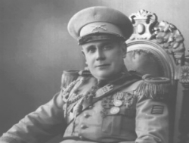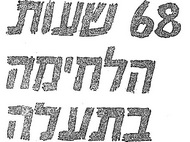
Sixty-one years after his death in 1961, Captain Arthur Carlos de Barros Basto, the founder of the Jewish community in Porto and a passionate advocate for the Bnei Anousim of Portugal, has been posthumously reinstated into the Portuguese army. He was drummed out of the military nearly seven decades ago for the “crime” of proudly proclaiming his Jewish heritage.
The decision to reinstate Barros Basto was made at the end of July by the Portuguese parliament and comes after nearly ten years of lobbying by Shavei Israel and the captain’s granddaughter, Isabel Maria de Barros Lopes, who last year submitted a formal request to the president of the Portuguese parliament. Shavei Israel then launched a widely publicized online petition to complement Lopes’ request. The petition garnered over 1,300 signatures.
Captain Barros Basto was a decorated soldier who commanded a Portuguese infantry company in World War I, fought in the trenches of Flanders, and took part in the allied offensive to liberate Belgium. In 1937, however, the Portuguese military summarily expelled him from its ranks, unjustly humiliating him all because he launched a public campaign to reawaken Portugal’s Bnei Anousim to return to their Jewish roots.
Barros Basto was himself a Bnei Anousim – a descendant of Jews whose ancestors had been forced to convert to Catholicism during the time of the Spanish Inquisition.
After the war, he embraced the faith of his forefathers and underwent a formal return to Judaism before a rabbinical court in Spanish Morocco. Donning his military uniform and medals, he traveled among the towns and villages of Portugal’s interior, giving rousing speeches, conducting Jewish services and seeking to inspire others to follow his example.
Turning to world Jewry for help, he succeeded in raising the necessary funds to build the magnificent Mekor Haim synagogue, which still stands in the city of Oporto, and opened a yeshiva that operated for nine years, teaching young Bnei Anousim about their heritage. He also single-handedly produced a Jewish newspaper, HaLapid (the Torch in Hebrew), and was responsible for the publication of numerous books on Jewish history and law in Portuguese.
But his open profession of Judaism, and the thousands of people he inspired, did not sit well with the government or the Church authorities of the time. They sought to quell his nascent movement by bringing him up on charges connected to the practice of the Jewish religion. The Superior Disciplinary Council of the Portuguese Army concluded that Barros Basto lacked the “moral capacity” to serve in its ranks.
And what constituted such a deficiency in morality? Incredibly, the military claimed that Barros Basto had “performed the operation of circumcision of several students pursuant to a precept of the Israelite religion he professes” and said that he was excessively affectionate toward his pupils. Stripped of his rank, the dishonorable discharge broke Barros Basto mentally, physically and financially. It also put a premature end to his efforts to reawaken Portugal’s Bnei Anousim, many of whom saw the treatment meted out to Barros Basto as a sign that the authorities would not tolerate their return to Judaism.
Barros Basto’s plight has been likened to that of Alfred Dreyfus, the French general staff officer who was convicted of treason on trumped-up charges in 1894 and also expelled from the military. However, unlike Dreyfus, there was no Portuguese Émile Zola who publicly denounced the French general’s injustice. Even after the fall of the Portuguese dictatorship in 1974, the Barros Basto family was not able to get a retrial.
Over the years, Shavei Israel has elicited support from a number of American Jewish organizations including the Conference of Presidents, the Orthodox Union and the Religious Zionists of America. In February 2012, in part as a result of our long campaign, a parliamentary commission unanimously adopted a report, which recognized the anti-Semitic background of the 1937 ruling and called for the rehabilitation of Captain Basto. The final approval of the report by the Portuguese parliament came at the end of last month.
Lopes, Barros Basto’s granddaughter and today the vice president of the Jewish community in Porto, told the media that this ruling “means the end to a struggle that had been pursued by my grandfather, my grandmother, my mother and myself.” She added that the ruling signifies that Barros Basto’s struggles and sufferings were “not completely meaningless.”
Captain Barros Basto’s reinstatement also gives us hope that other historic wrongs and anti-Semitic discrimination may someday be set right.
And, perhaps most of all, it demonstrates that advocacy and the intrinsically Jewish attitude of “never giving up” can – and must – achieve tangible results. With the conclusion of the Barros Basto affair, a stain has been removed from a noble man’s name. May his soul finally be able to rest in peace.




